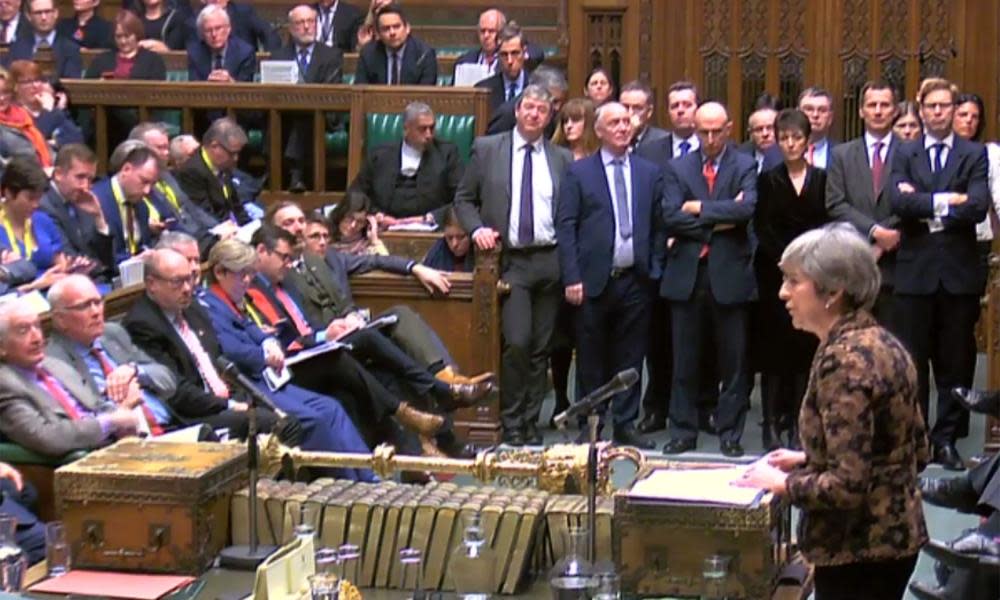What are May's options for a plan B that could win over the Commons?

Theresa May’s plan B is to try to get her plan A through the Commons with some tweaks on the Irish backstop. But are there other options that could command a Commons majority – and who would support them?
Here’s a quick guide to what MPs could vote for, based on dividing the Commons into various groupings, explained below. The numbers of those groups are roughly estimated using public records and voting histories, although these factions could easily splinter further in any of these scenarios.
The groupings explained
Tories for a second referendum – 9
These are the Conservative MPs like Dominic Grieve, Sarah Wollaston, Anna Soubry, Phillip Lee, Sam Gyimah, Guto Bebb, Justine Greening and Jo Johnson who will back any moves for a second referendum and stopping no deal.
Conservatives who will block no deal – 12
These MPs are not in favour of a second referendum and mostly voted for May’s deal, but will put as many roadblocks as they can in the way of a no-deal Brexit. They include former minister Nick Boles, Nicky Morgan and Sir Oliver Letwin.
Brexiters who oppose May’s deal – 109
These are the Tory MPs who have voted against the prime minister’s Brexit deal. Many are hard Brexiters who would be comfortable with no deal, but others are ex-remainers uncomfortable with the backstop.
Should May manage to deliver a firm end date to the backstop, she could win back most of their votes. A minority would also like to see the backstop removed entirely and a reduction of the £39bn payment to the EU.
Conservative loyalists and payroll – 186
This group include ministers, whips and other frontbenchers, as well as Tory loyalists who are happy to vote for Theresa May’s Brexit deal as it currently stands.
Democratic Unionist party MPs – 10
The Northern Irish party voted against the government’s Brexit deal because of the backstop arrangement, and could be won over if there are some changes to it.
Labour for a second referendum – 71
Support for a second referendum is likely to be more widespread than this but not all Labour MPs who hold frontbench position have publicly declared support. These 71 MPs are those who have publicly declared their support and would vote for a referendum even if they were whipped to oppose.
Labour MPs opposed to a second referendum – 30
Labour MPs who do not want the party to back a second vote have been privately keeping track of the number who would actively oppose it, even if it was whipped by the Labour frontbench. Sources claim about 30 would be actively prepared to rebel.
Labour loyalists and independents – 150
These include Jeremy Corbyn’s frontbench and the majority of Labour MPs who are likely to follow the Labour whip.
Labour Brexiters and MPs who back May’s deal – 3
Only three Labour MPs have backed May’s deal as it currently stands though this number would be likely to grow if it became a softer Brexit or if no deal became a more likely possibility. Others could merge into this group depending on the question, including Labour hard Brexiter Kate Hoey.
The SNP, Lib Dems and other parties – 51
These MPs, who also include Plaid Cymru and the Greens’ Caroline Lucas, are all supporters of a second referendum.
Independents – 8
These MPs are not easy to place. Ex-Labour MPs Ivan Lewis and Jared O’Mara have tended to vote with their former party. Independent MP Sylvia Hermon, former Labour MP Frank Field and the former Lib Dem MP Stephen Lloyd have tended to vote with the government on Brexit issues. Another ex-Labour MP Kelvin Hopkins is a Brexiter, but also a Corbyn loyalist.
Don’t vote – 11
The Speaker, his three deputies and seven Sinn Fein MPs do not vote.

 Yahoo News
Yahoo News 
